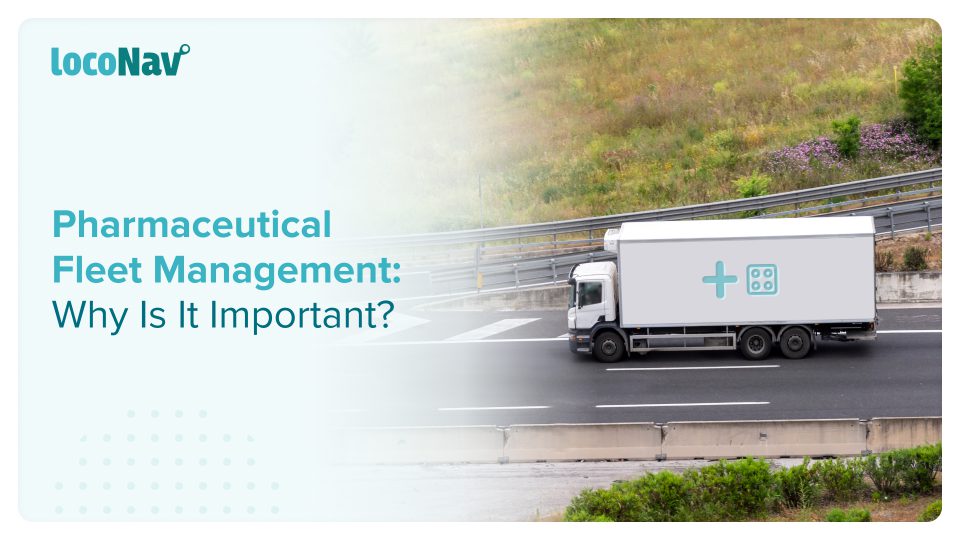

Pharmaceutical fleets have special requirements. A large mobile workforce that makes multiple stops can be difficult to manage. Problems with maintaining the proper temperature can lead to significant financial losses as well as quality complaints and health concerns from end users. During transportation, fleets delivering pharmaceuticals and medical supplies must keep the trailer temperature within the required parameters.
A simple telematics platform improves the understanding of fleet operations, maintaining cost control with trend reports on fuel consumption, speeding, idling, and other important fleet metrics.
In this blog, we will discuss why pharmaceutical fleet management is important and essential for pharmaceutical distributors.
Biggest Challenges in Pharmaceutical Transportation Industry
Although global supply chains have conclusively demonstrated resilience, many lessons have been learned. So, what are the most pressing challenges for pharmaceutical supply chains and how pharmaceutical fleet management can help.
- Cargo Security
Since biopharmaceuticals are expensive medical products, they make an appealing target for thieves. The cost of brand-name medicines, combined with unending man-hours of research and development, makes them extremely valuable. Cargo security has always been an important aspect of cold chain logistics. This means that pharmaceutical companies must invest more in security systems, both in storage and transportation.
- Temperature Control
Almost all pharmaceuticals must be stored at a specific temperature during the transportation time frame from origin to destination. The goal of temperature control is to ensure that the drugs are useful to the patients who are taking them. Some pharmaceuticals can degrade if stored at the incorrect temperature. As a result, many logistics companies must provide temperature-controlled freight options.
- Warehouse Management
Over the last decade, the global pharmaceutical market has nearly doubled, resulting in increased sales volume and penetration in developing countries around the world. This means that the importance of warehouse management cannot be overstated. For this task, the pharmaceutical industry must depend heavily on logistics services. This need has become even more pressing as markets have become more appealing, visibility in the supply chain has increased, and costs have been reduced.
Manage your fleet efficiently with LocoNav’s Fleet Management Solutions!
Benefits of Pharmaceutical Fleet Management
Here are some important benefits of using pharmaceutical fleet management for your fleet.
- Reduced Costs
Fleet management software includes a significant amount of automation. You can have a strategic process for vehicle maintenance, repairs, and regular fleet audits with automated reminders and email notifications. This practice extends the fleet’s lifespan and saves money on new vehicles that need to be replaced due to irreparable damage.
Another important factor in lowering fuel costs is fuel management. Fleet managers can monitor vehicles that consume more fuel or driving techniques that result in fuel waste by forecasting actual fuel consumption on specific routes or distances. Companies can accomplish this by automating fuel management using pharmaceutical fleet management.
- Improved Driver Performance
When drivers are on the road delivering goods, fleet managers face a challenge in keeping track of their performance. Poor driving techniques frequently shorten the life of a fleet and even result in fatal accidents.
Pharmaceutical fleet management provides viable solutions for easily monitoring driving patterns and improving driver behaviour. GPS tracking, for example, is a critical component of telematics. Managers and dispatchers can use it to track the location, speed, harsh driving methods, and vehicle diagnostics. With the availability of data on each driver’s performance, fleet managers can plan strategies to reduce risks and reinforce durability.
- Increased Customer Satisfaction
Customers typically abandon a brand due to poor delivery service. You can use a fleet management system like LocoNav to use optimized routing, improve ETA efficiency, and achieve error-free deliveries. Because fleet managers have real-time traffic and transit delay updates, they can simply prioritize deliveries to some customers.
Furthermore, drivers use their dashboards to view customer locations and optimize working hours based on estimated delivery times. The dual benefits of this practice are that fleet managers can focus on other issues, and drivers can work according to delivery requirements.
- Automated Reporting
A pharmaceutical fleet management software not only collects useful data but also offers insights. The system creates reports on vehicle maintenance, driving techniques, delivery time, rest breaks, and more using information collected by GPS tracking systems, onboard devices such as the odometer, and Electronic Logbooks.
This data can assist managers in understanding the performance of their drivers and instructing them accordingly. By incorporating APIs into the system, information sharing will become more efficient and cost-effective.
FAQ
What Is The Difference Between Pharmaceutical Fleet Tracking And Pharmaceutical Fleet Management?
Pharmaceutical fleet tracking only keeps you updated on the location of your vehicle, while pharmaceutical fleet management does so much more. With it, you can automate reporting, keep track of location, receive real-time alerts, manage fuel consumption, monitor driving behaviour, and do much more.
How To Self-Inspect Pharma Drivers And Fleet?
Pharmaceutical drivers and vehicles can be inspected using LocoNav’s Driver Scorecard and Vehicle Scorecard respectively.
How To Locate Missing Pharma Delivery Packages?
It is advised to affix your pharma deliveries with asset tags. Using asset tags, you can easily locate missing pharmaceutical delivery packages.